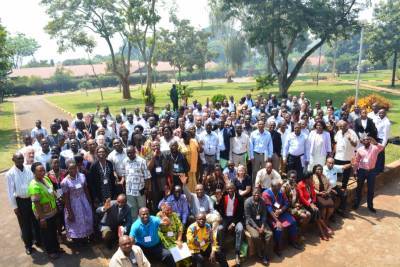
Five Duke Divinity School students will attend the ninth annual Great Lakes Initiative Leadership (GLI) Institute on Jan. 6-11, 2019 in Kampala, Uganda.
Krystal Bracy, M.Div. ‘20; Carie Dupree, M.Div. ‘20; Sharice Lloyd, M.Div. ‘19; Ryan Ware, M.Div ‘21; and Philip Zoutendam, M.Div. ‘20; were selected by the Center for Reconciliation (CFR) at Duke Divinity School. The students will receive close to full funding to cover the cost of the institute and travel.
The students will join more than 100 Christian leaders in the GLI network to explore how the theology of reconciliation can build peace in the Great Lakes region of East Africa. During the five-day institute, based on the same model as the Summer Institute for Reconciliation held at Duke Divinity School every summer and the Northeast Asia Christian Forum for Reconciliation, the students will learn from leading theologians and practitioners of reconciliation. They will also worship with the other participants and journey on a pilgrimage in the region that offers a vision of reconciliation. The institute draws people from Burundi, the Democratic Republic of the Congo, Ghana, Kenya, Rwanda, South Africa, South Sudan, Tanzania, Uganda, and the U.S.
As part of its commitment to form students as ambassadors of reconciliation, the CFR selects students to attend the GLI institute each year. Students learn about reconciliation in the context of the Great Lakes Region in order to strengthen their understanding of reconciliation in their future ministries.
Bracy studied African politics as an undergraduate and highlighted her interest in visiting the African continent for the first time as an African American. “Most African Americans don’t have a real understanding of Africa besides mainstream media depictions. I hope to learn the process of establishing a unifying force for Black people to connect, including but not limited to, Pan-Africanism and the diaspora,” she said.
Dupree plans to become a deacon in the United Methodist Church and work as a legal advocate for incarcerated and formerly incarcerated individuals. She hopes the GLI Institute will give her a renewed vision, especially when reconciliation on matters of race in the United States seem unattainable, saying, “I feel that the Institute will help me understand how to go about with reconciliation when it does not seem possible.”
Lloyd looks forward to returning to Uganda, where she completed her field education placement this past summer. “Just as the saints gather at Pentecost spoke various languages, I think that reconciliation has a unique method, technique, and cultural implication. For me, reconciliation has a face, a name, a specific dialect, not just words on a paper that can be folded and tucked away,” she said.
Ryan Ware, a fellow member of the United Methodist Church, said his experiences in his church’s racial reconciliation ministry in Louisiana encouraged him to apply. While he said that reconciliation would look different in the East African context, learning those nuances would prepare him for a variety of contexts. He said, “As a white person, I need more experience understanding the issue from the other side.”
Zoutendam, who is seeking ordination in the Episcopalian church, noted that African churches are beginning to take lead in the Anglican Communion. “The five days at GLI would be not only learning, but shared liturgy as we walk together—sometimes literally—through acts of lament and pilgrimage that commission us for peacemaking in our respective contexts.”
More than 30 Duke Divinity students have attended the GLI Leadership Institute since its inception in 2009. In 2016 and 2017, as many as 10 students have attended each year as part of the “Reading(s) for Our Lives: Contemporary African Biblical Interpretation” class taught by Ellen Davis, Amos Ragan Kearns Professor of Bible and Practical Theology and Father Jacob Wenyi, Ph.D.
The CFR is one of the founding partners of the GLI network, along with the African Leadership and Reconciliation Ministries, the Mennonite Central Committee, and World Vision International.